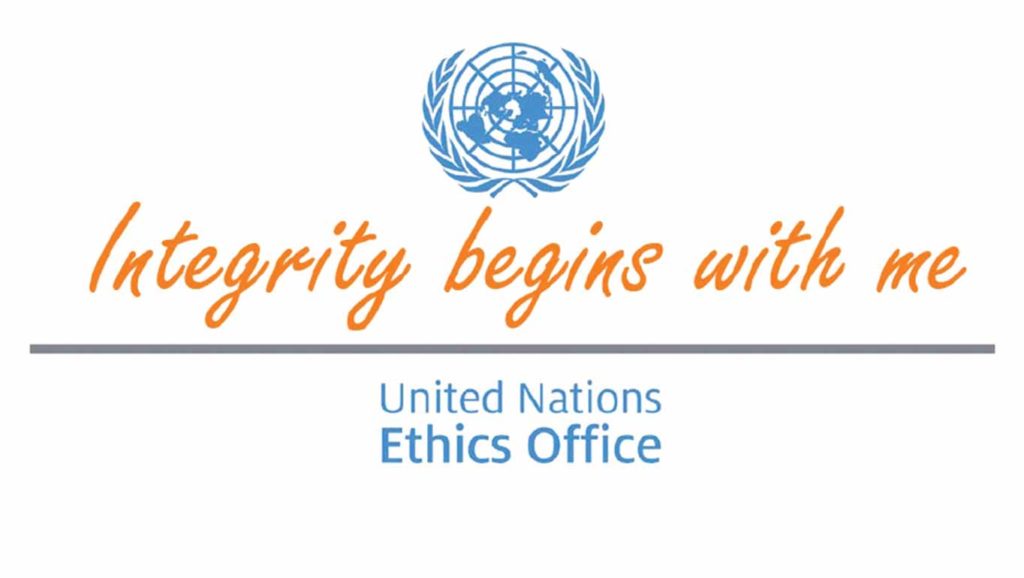The organization has put in place a robust framework to protect personnel against retaliation. The Ethics Office administers the policy on protection against retaliation and is fully committed to ensuring the appropriate application and protection of staff.
As international civil servants, UN staff members have agreed to uphold the Staff Regulations and Rules and the Standards of Conduct. When those rules are breached, staff know that they are required by Staff Rule 1.2(c) to report misconduct and to cooperate with duly authorized investigations that may result from such reports. The rule also states that staff will not be retaliated against for complying with these duties. While staff recognize this obligation, it does little to allay fears of possible retaliation that can prevent reporting, inhibit full cooperation, and cause significant stress.
Staff should be able to “speak up” through all available mechanisms without retribution. Given the many forms of speaking up and the various available avenues, – heads of entities, managers, peers, the Ethics Office, other independent offices, and judges – all have a role to play in prevention and protection.
There are differences among (a) a “witness protection program” that proactively protects complainants from retaliation, (b) a “whistleblower” protection against retaliation policy, which aims to enhance protection for individuals after they have engaged in “protected activities”, and (c) protecting staff who are retaliated against after activities that do not qualify for enhanced protection under the protection against retaliation policy.
Staff should be protected against retaliation in all instances. The questions are: (a) who is best placed to provide proactive preventive measures? and (b) which policy/burden of proof should apply?

The obligation to proactively protect lies largely with heads of entities. Under the prohibited conduct policy, heads of entities must monitor a staff member’s situation when they are informed in writing that a staff member: engaged in a process under the prohibited conduct policy, acted as a staff representative, requested management evaluation, or appeared as a witness before the Tribunals. For example, if a staff member files a sexual harassment complaint against their supervisor and informs the Head of Entity, they must monitor the staff member’s situation to ensure that no adverse action is taken. This could include monitoring the performance evaluation process to ensure fairness or engaging with the Second Reporting Officer to ensure that no further harassment occurs.
Additionally, Tribunal judges must protect witnesses and parties from harassment and bullying during proceedings pursuant to the code of conduct. Judges are best placed to assess a risk of retaliation and provide proactive preventive measures, which could include the issuance of protective orders, anonymous testimony, in camera or closed session testimony or the anonymization of witness names in judgments.
There is also a proactive feature in the protection against retaliation policy. With consent, OIOS informs the Ethics Office of any report of wrongdoing received that it identifies as posing a retaliation risk and the Ethics Office can recommend appropriate retaliation prevention action, which varies depending on the circumstances. The Ethics Office remains in contact with the staff member during the investigation to ensure the measures remain effective.
The purpose of the protection against retaliation policy is to ensure that the UN functions in an open, transparent and fair manner, with the objective of enhancing protection for individuals who engage in protected activities: reports of misconduct (any violation of the UN’s rules by staff members), reports of wrongdoing (that would be harmful to the interests, operations or governance of the UN), or cooperation with audits or investigations. The policy applies after a staff member has engaged in a protected activity and where detrimental action has been recommended, threatened or taken after and because of engagement in the protected activity.
Retaliation as a consequence of “speaking up” that is not a protected activity may be prohibited conduct that should of be addressed under the prohibited conduct policy. For example, suppose a staff member corrects his supervisor at an important meeting in front of senior managers.
The supervisor is angry and embarrassed and refuses to approve annual leave. This does not fall under the protection against retaliation policy as the staff member has not yet made a report of misconduct (protected activity). However, the conduct could be an abuse of authority, which should be handled under the prohibited conduct policy, either informally or formally.
While there is consensus about the need to protect staff from all forms of retaliation, the conflation of a “whistleblower” protection against retaliation policy with a prohibited conduct policy may work at cross purposes. Expanding the scope of protected activities under the “whistleblower” protection policy would result in the application of the reverse burden of proof to matters that do not involve “whistleblowing”, undermining the intent of the policy to provide enhanced protection to those who have engaged in protected activities.
What if a staff member is afraid to make the report in the first place? It is very common for staff to fear coming forward, whether at the UN or at other organizations. It takes courage to speak up. Supervisors are responsible for creating a harmonious working environment, where respectful dissent and speaking up is encouraged. Staff can seek support and guidance from the Ethics Office, OIOS, the Office of the Ombudsman and Mediation Services, Staff Union representatives, Conduct and Discipline focal points, and the Staff Counsellor at their duty station.
What if a staff member fears retaliation after making a report of misconduct but no detrimental action has been taken? Proactive monitoring by the Head of Entity may apply and, if the report was made to OIOS, they may refer the matter to the Ethics Office for preventive action. For example, suppose a staff member reports his section chief for abuse of authority to OIOS. The staff member tells OIOS that his contract is up for renewal in three months and is concerned that it might not be renewed once the investigation starts. OIOS may refer the matter to the Ethics Office, who would recommend that the contract renewal process be conducted fairly. The staff member could also notify the head of entity in writing that a report was made, triggering an obligation to monitor.
What if a staff member reports misconduct and a detrimental action is taken following the report? For example, suppose a staff member makes a report of procurement fraud with OIOS. OIOS initiates an investigation and begins interviews. The staff member’s functions and supervisees are removed. The staff member should file a request for protection against retaliation with the Ethics Office. The Ethics Office will conduct a preliminary review of the request to determine whether the complainant engaged in a protected activity and there is a prima facie case that the protected activity was a contributing factor in causing the alleged retaliation. If there is a prima facie case, the matter is referred to OIOS for a retaliation investigation and the burden of proof shifts to the Administration to prove by clear and convincing evidence that it would have taken the same action, absent the protected activity.
The Ethics Office recommends measures to ensure the complainant is not retaliated against during the investigation. If there is no prima facie case of retaliation, the Ethics Office informs only the complainant in writing and further review by the Alternate Chair of the Ethics Panel may be requested.
Being able to speak up without fear of retaliation is critical for building a culture of transparency, integrity and accountability. The UN has a robust protection against retaliation framework and the UN Ethics Office remains committed to ensuring its application.
For any questions, please contact the Ethics Office at ethicsoffice@un.org.


